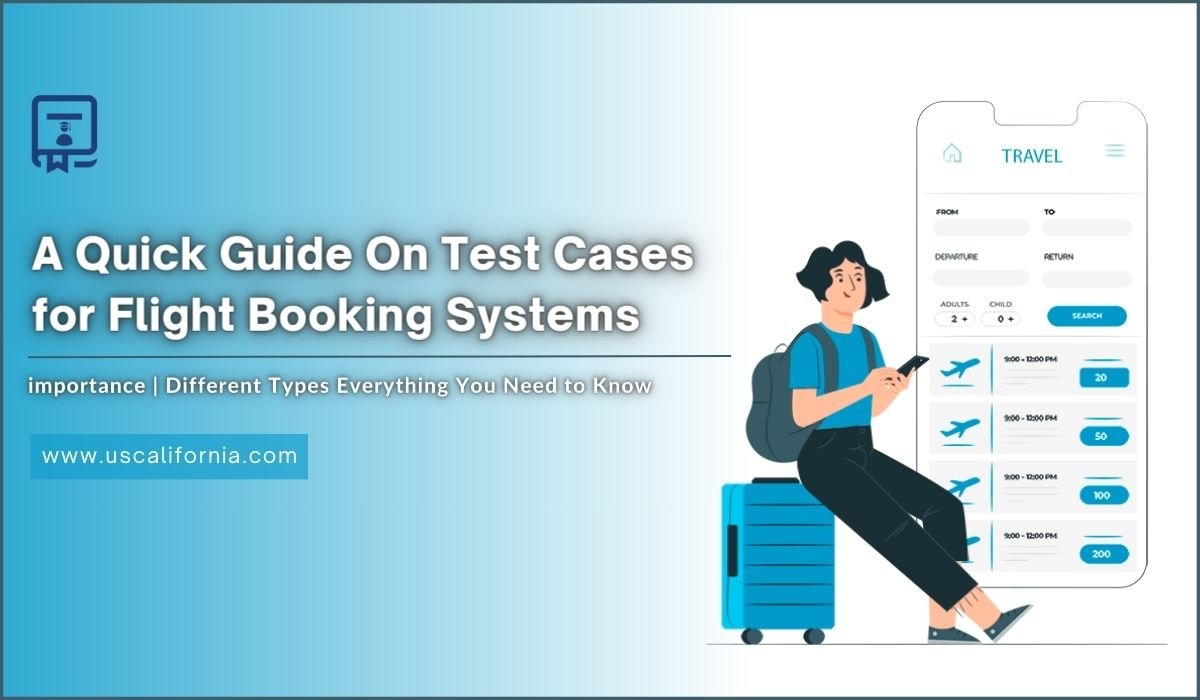In the fast-paced world of travel, where countless flights take off and land daily, a robust flight booking system is the backbone of any successful airline or travel agency.
These systems are responsible for handling an array of critical functions, from searching for available flights to processing payments and issuing tickets.
With such intricate operations at play, it becomes imperative to ensure that these systems are thoroughly tested to guarantee seamless customer experiences and operational efficiency.
Therefore in this comprehensive guide, we will talk about the test cases for flight booking systems and explore their significance, types, and why they are indispensable for the travel industry.
So, let’s get started.
What is a Flight Booking System?
A flight booking system is a sophisticated software application used by airlines, travel agencies, and online platforms to facilitate the reservation and purchase of airline tickets. These systems serve as a one-stop solution for travelers which allows them to search, book, and manage their flights efficiently.
Behind the user-friendly interfaces of flight booking systems lie intricate databases, algorithms, and integrations that ensure travelers can find the perfect flight for their needs.
Why is Testing Flight Booking Systems Important?
The reliability and seamless functionality of flight booking systems play a pivotal role in the travel industry. Opposite can lead to missed flights, financial losses, and disgruntled customers.
Let’s understand in indepth why testing flight booking systems is crucial:
Customer Satisfaction: Testing of a flight booking system ensure that travelers can easily find, book, and pay for flights contributes to a positive customer experience. Delays, errors, or payment issues can lead to dissatisfaction and potentially tarnish an airline’s reputation.
Financial Stability: A flaw in the booking process can result in financial losses for both airlines and customers. Testing helps prevent booking errors that might lead to overbooked flights or discrepancies in fares.
Data Security: Flight booking systems handle sensitive passenger data, including personal information and payment details. Therefore, robust testing is necessary to safeguard this data from breaches and security threats.
Operational Efficiency: Efficient flight booking systems streamline airline operations. A well-tested system reduces the likelihood of technical glitches that can disrupt flight schedules and impact revenue.
Competitive Edge: In a highly competitive market, airlines and travel agencies need reliable booking systems to stand out. A malfunctioning system can drive customers to competitors.
So, now you you have got acquainted with why testing a flight booking system is important. It’s time to check out the various types of test cases that ensure these systems operate flawlessly.
Different Types of Test Cases for Flight Booking Systems
When it comes to testing flight booking systems, a variety of test cases must be meticulously executed to guarantee optimal performance. These test cases can be categorized into the following types:
1. Functional Test Cases
Functional Test Cases are a set of scenarios designed to validate that a software application functions as intended.
Here are a few functional test cases you need to keep in mind while testing flight booking systems:
Verify Search Functionality: Test the system’s ability to search for flights based on parameters such as origin, destination, date, and time. Ensure it returns accurate and relevant results.
Check Flight Information Display: Verify that the system displays precise flight details, including flight numbers, airline names, aircraft types, departure and arrival times, and ticket prices.
Seat Selection and Passenger Addition: Test if users can select seats and add passengers seamlessly which takes into account factors like seat availability and passenger details.
Fare Calculation and Payment Processing: Test to ensure that the system accurately calculates the total fare, including taxes and additional charges. Test payment processing for smooth transactions.
Confirmation Emails and SMS: Confirm that users receive confirmation emails or SMS messages after successfully booking their flights. These communications should include all relevant details.
2. Non-Functional Test Cases
Non-functional test cases focus on the performance, security, and usability aspects of a software application.
When testing flight booking systems here are a few non functional test cases you need to consider:
Performance Testing: Evaluate the system’s performance by simulating a large number of users accessing it simultaneously. Load and performance testing companies and Performance testing companies Assess their response time and resource utilization under peak load conditions.
Security Testing: Verify that the flight booking system is protected against common security threats, such as SQL injection and cross-site scripting to ensure the encryption of user data.
Accessibility Testing: Confirm that the system is accessible to users with disabilities, complying with accessibility standards and guidelines. Test screen readers, keyboard navigation, and other assistive technologies.
Usability Testing: Evaluate the system’s user-friendliness by assessing its ease of use and navigation. Check if error messages are clear and concise.
3. Regression Test Cases
Regression Test Cases are a set of test scenarios and cases aimed at ensuring that new code changes or enhancements to a software application do not adversely affect existing functionalities.
Here is what you need to consider testing:
Functionality Regression: After introducing new features or system updates, ensure that existing functionality remains intact and is not adversely affected.
4. Integration Test Cases
Integration Test Cases are a collection of test scenarios and cases that evaluate the interactions and interoperability of different components or modules within a software system.
Here is how to approach this:
Integration with Payment Processing Systems: Verify that the flight booking system integrates seamlessly with payment processing systems, ensuring secure and efficient payment transactions.
Integration with Airline Reservation Systems: Test the integration with airline reservation systems to confirm the accuracy of flight availability and pricing.
5. Security Test Cases
Security Test Cases are a set of test scenarios and cases designed to evaluate the security features and vulnerabilities of a software application.
Here is what you need to pay attention to:
Data Privacy and Protection: Check if user data is securely stored, transmitted, and protected. Validate that sensitive data is not exposed or accessible to unauthorized parties
6. Usability Test Cases
Usability Test Cases” refer to a series of test scenarios and cases that assess how user-friendly and intuitive a software application is. The goal is to identify areas for improvement in terms of accessibility, efficiency, and overall user satisfaction, enhancing the software’s usability and appeal.
Here is how to do it:
User Experience Assessment: Evaluate the overall user experience, taking into account users of varying skill levels. Ensure the system caters to a diverse user base.
Error Handling: Assess how the system handles errors, providing clear and informative error messages to guide users in case of issues.
7. Performance Test Cases
Performance Test Cases gauge how well a software application performs under different conditions, ensuring it runs efficiently and meets performance expectations.
Here is how to test it:
Scalability Testing: Determine if the system can scale efficiently to accommodate an increasing number of users without compromising performance.
Response Time Testing: Measure the system’s response time for various user actions, such as flight searches, seat selection, and payment processing.
Conclusion
The comprehensive testing of flight booking systems is not just a best practice infact it is a necessity for the travel industry. These systems serve as the gateway to travel for millions of passengers worldwide, and any glitches or errors can lead to dire consequences. By executing a wide range of test cases, including functional, non-functional, regression, integration, security, usability, and performance tests, airlines and travel agencies can ensure that their flight booking systems function seamlessly, offering travelers a stress-free and efficient booking experience.
As technology trends in airline industry continues to advance and customer expectations evolve, rigorous testing remains at the heart of maintaining reliable and user-friendly flight booking systems. By prioritizing thorough testing procedures, the travel industry can soar to new heights, providing travelers with unforgettable journeys and exceptional service. In a competitive landscape, where every booking matters, investing in robust testing practices is the key to success.

